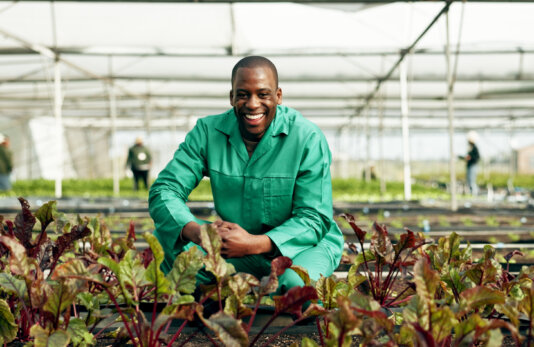- About
- Topics
- Story
- In-Depth
- Picks
- Opinion
- News
- Donate
- Signup for our newsletterOur Editors' Best Picks.Send
Read, Debate: Engage.
| topic: | Sustainable Agriculture |
|---|---|
| tags: | #Sustainable Agriculture, #climate action, #Africa, #climate adaptation |
| located: | Kenya |
| by: | Ousmane Badiane |
Disclaimer: The views expressed in the article belong to the author and do not necessarily represent the position of FairPlanet.
Safeguarding food systems from the rising tide of climate change is nowhere more urgent than in Africa. The continent is significantly exposed to climate threats, exacerbated by unprecedented weather extremes. Beyond the agricultural sector, the adverse effects of climate change are permeating critical development areas, including energy, industry, health, mining, transport and water.
Governments across the continent have recognised the urgent need for climate action in food systems. For instance, all but one country have completed their Nationally Determined Contributions (NDCs), and close to one-third have submitted their National Adaptation Plans (NAPs), with agriculture and livestock, water and health emerging as the three most frequently identified prioritised sectors for adaptation.
These policy trends are fitting, as agriculture is the backbone of African economies and development. Yet, the sector receives a fraction of funding for climate adaptation. Moreover, Africa’s access to international climate finance remains low and insufficient, with total access estimated at only 5 per cent of the global finance available.
For sustainable impact, investment and political will for climate adaptation must be guided to those underserved sectors, agriculture included, which are facing the greatest dangers yet can also generate the most benefits for the future.
The 2023 ReSAKSS Annual Trends and Outlook Report (ATOR), published by AKADEMIYA2063 and the International Food Policy Research Institute (IFPRI), posits that the transformation of African food systems in the post-Malabo era requires a concerted effort that encompasses policy reforms, investment in technology and innovation, commitment to nutrition and food safety, gender equity and climate resilience strategies.
Climate adaptation in Africa’s agriculture will be vital in delivering food security and resilient livelihoods for millions across the continent, particularly for the small-scale farmers on the frontlines of climate change.
To avoid the full brunt of current and future climate challenges, and to unlock the full potential of Africa’s economic growth, urgent steps must be taken to adapt the continent’s agricultural sector to rising climate impacts. This not only requires action by African governments themselves, but also the close backing of global climate finance mechanisms – beyond the initial funding agreed for climate loss and damage.
Scaling up adaptation practices in agriculture to avoid the damaging impacts of climate change while building resilient opportunities for the continent’s farmers and the communities they support will be crucial.
For instance, the 2023 ATOR highlights how ramping up investment in soil and water conservation to reach 40 percent of cropland would minimise the effects of climate change on the economy in Kenya, while ensuring up to 60 percent of cropland experienced similar conservation measures would likewise deliver climate adaptation benefits.
Elsewhere, investments in the planting of improved seeds and use of fertilisers can similarly deliver adaptation benefits for African economies. In Kenya, this means boosting the share of cropland planted with improved varieties by 36 percent compared to 2019 levels, and in Nigeria, up to 50 percent.
Likewise, given that agriculture remains predominantly rainfed across the continent, and with weather patterns becoming increasingly less predictable due to climate change, investment in irrigation must be scaled up to reach 25 to 50 percent of cultivated areas across most African countries in order to safeguard harvests for the future.
But to support such a surge in technologies and cropping practices for climate adaptation, African countries require significantly greater levels of adaptation finance than is currently being provided.
Although wealthy countries finally met their goal in 2022 of providing $100 billion in annual climate finance for poorer, more climate vulnerable nations, this was nonetheless two years late, and climate damages have continued to climb - including across Africa.
Amidst this backdrop, and despite the economic potential it promises to unlock, African countries will not meet their climate adaptation goals without significantly higher international funding. This funding gap must be urgently addressed, particularly as Africa has been at the receiving end of the climate crisis, accounting for less than 4 percent of historic emissions, yet stands on the frontline of climate impacts.
As Africa embarks on the next decade of the Comprehensive Africa Agriculture Development Programme (CAADP), the continent’s agricultural sector holds significant potential to deliver resilient and sustainable livelihoods for the future.
Yet, this potential requires a more robust adoption of climate adaptation practices in agriculture, backed by significantly greater commitments than previously delivered by many of the world’s leading economies.
Investing in adaptation efforts in agrifood systems will future-proof Africa’s economic growth while supporting the continent’s agriculture sector to feed itself and the world amid a rapidly changing climate.
Dr Ousmane Badiane is the Executive Chairperson of AKADEMIYA2063.
Image by Yuri Arcurs.
